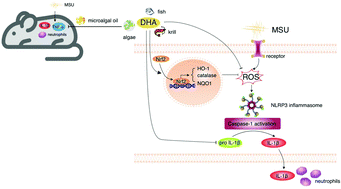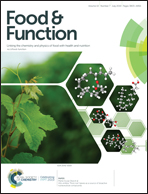DHA protects against monosodium urate-induced inflammation through modulation of oxidative stress
Abstract
Acute gouty inflammation could be triggered by phagocytosis of monosodium urate (MSU) by immune cells. This study investigated the protective effect and underlying mechanism of docosahexaenoic acid (DHA) on MSU-induced inflammation in vitro and in vivo. Results showed that DHA effectively inhibited MSU-induced expression and secretion of interleukin-1β (IL-1β) and tumor necrosis factor-α (TNF-α) in THP-1 cells. Intracellular reactive oxygen species (ROS) production triggered by MSU was alleviated by DHA treatment. Furthermore, DHA promoted the nuclear translocation of nuclear factor E2-related factor 2 (Nrf2), wherein Nrf2 further mediated the expression of multiple antioxidant enzymes such as, heme oxygenase-1 (HO-1), NAD(P)H: quinone oxidoreductase-1 (NQO1) and catalase, which are closely related with redox homeostasis. DHA treatment also restored MSU-induced impairment of mitochondrial transmembrane potential. In addition, oral administration of DHA-rich microalgal oil to C57BL/6 mice effectively reduced the infiltration of neutrophils, and decreased the expression and secretion of inflammatory cytokines. Altogether, our results suggest that DHA or DHA-rich microalgal oil may be a promising natural agent for the prevention of MSU-induced inflammation and potentially acute gout at least partly by attenuating oxidative stress.



 Please wait while we load your content...
Please wait while we load your content...